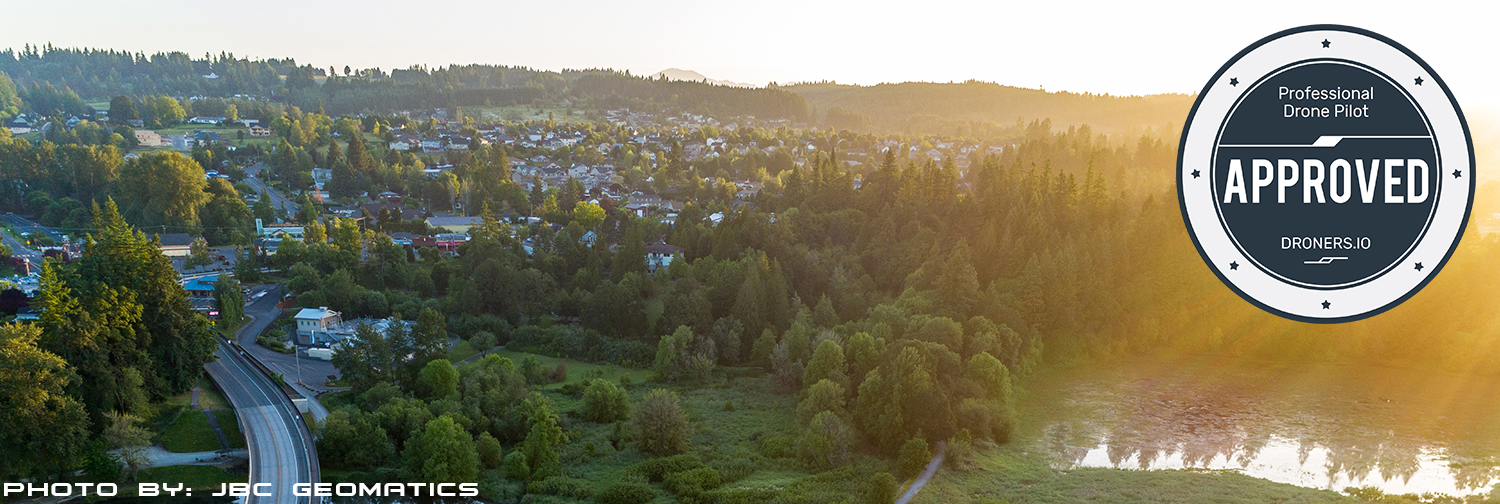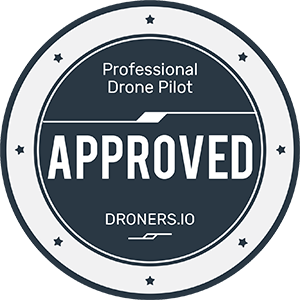Introduction
I just added my Federal Aviation Administration remote pilot certificate to my profile on Droners.io and realized that I’ve had that account since August 2015. Despite being a member there for over five years, I’ve never made any money through the site. To be fair, when I joined, drone services weren’t as common as they are now, and after they started enforcing the Part 107 license requirement in 2016 I wasn’t able to bid on jobs. Now that I have passed my airman knowledge exam and have my FAA remote pilot certificate I’m wondering if someone can make a full time living with sites like Droners.io.
While remote pilots do make money with pilot networks like Droners.io, it may be better suited for newer drone pilots to get practical experience. Although, even seasoned drone services companies report that they use it as a way to “fill the gaps” between regular client assignments.
What is the history of Droners.io?
Droners.io was registered as a domain in June 2015 by founder Dave Brown. By the end of June, the senior software engineer and entrepreneur was already testing the platform with his first pilot profile. After just two months of being online, Droners.io was reporting that more than 1,200 remote pilots had joined the marketplace.
 In February of 2018, Precisionhawk announced the acquisition of Droners.io along with the plan to merge it with Airvid, another drone pilot marketplace. According to a Precisionhawk press release, combining the two companies created a network of more than 15,000 commercially licensed drone pilots – making it the largest of its kind at the time.
In February of 2018, Precisionhawk announced the acquisition of Droners.io along with the plan to merge it with Airvid, another drone pilot marketplace. According to a Precisionhawk press release, combining the two companies created a network of more than 15,000 commercially licensed drone pilots – making it the largest of its kind at the time.
How Does Droners.io Work For Drone Pilots?
Droners.io is a drone services broker, more commonly referred to as a pilot network or drone aggregator. After you create an account you’ll wait a few days for Droners.io to manually review the remote pilot certificate that you uploaded. Once verified, you’ll be able to see and bid on jobs posted in your area.
After your account is approved, prospective clients will be able to see your public profile and any portfolio images and/or videos you’ve uploaded. They can reach out to you directly through the Droners.io messaging system or they can post a job and wait for you to bid on it.
Once the client has reviewed the remote pilots’ bids, they will pick their preferred drone service provider and assign the contract. If you’ve won the bid then you can work with the client to further refine their requirements and plan and complete your assignment.
Once you deliver the images and/or video to the client and mark the job completed on the Droners.io platform, the client has two days to review and approve the work before their credit card is automatically charged. Droners.io uses stripe to complete the transaction with the client and pays the pilot after subtracting a 10% service fee for themselves. This is typically how drone aggregators (and other similar marketplace websites) make their revenue; by taking a percentage of all the completed transactions on the platform.
One Remote Pilot’s Experience with Droners.io (JBC Geomatics)

Adam Mosbrucker has no shortage of professional qualifications. He is a certified Geographic Information System Professional, professional photographer/videographer, and carries a remote pilot certificate from the Federal Aviation Administration. He launched his drone services company, JBC Geomatics, on his daughters birthday in June of 2019.
JBC Geomatics works with clients in the real estate, construction, and aerial mapping industries as well as for special events like weddings. In the example below you can watch as Adam documents the construction of the Vancouver Clinic from September of 2019 until October of 2020.
Adam reports that he has completed a total of three drone jobs through the Droners.io marketplace, and has earned $1200 in total revenue from that work. The three clients he worked with on Droners.io were so satisfied by the quality of his work that they fostered a one-on-one relationship with JBC Geomatics which, so far, has resulted in $3000 of additional work for Adam and his company.
His opinion on the value of Droners.io to his company:
I think it was a great way to get started but as I’ve gained experience, and quality, I think I’ve simply ‘outgrown’ the platform. ~Adam Mosbrucker / JBC Geomatics
How can Droners.io and Pilot Networks Help Independent Drone Businesses
Many drone pilots report having success getting work through pilot networks like Droners.io – especially early in their career. Even as your drone services company grows you might find that drone aggregator jobs can supplement your primary client income. Charlie Rohan of Another Level Aerial Services has completed multiple assignments on the Droners.io platform and had this to say about his experience:
Droners.io has been really good to me. I’ve been able to get quite a bit of filler work and a couple good sized contracts through them. ~Charlie Rohan / Another Level Aerial Services
Michael Hill is the founder of Cumulus Technologies, a UAS (Unmanned Aerial Systems) consulting company based out of Texas. Michael has introduced students, community members, business leaders, public safety entities and organizations to the unmanned aerial systems industry and has trained and mentored many of these individuals to become licensed remote pilots. He is deeply ingrained in the drone community and is convinced of the benefit of pilot networks.
I have flown several hundred missions on Droners.io. It is a good platform for filler work in between my other clients. I fly 20–25 missions every week between them Dronebase and DroneUp. ~Michael Hill / Cumulus Technologies
Before Accepting Your First Droners.io Job Take These Things Into Consideration
Conduct a thorough risk assessment
Keep in mind that clients who post jobs on the Droners.io marketplace most likely don’t have the knowledge of airspace and FAA regulations as you. Before bidding or agreeing to a proposed job make sure you research the location requested. In an update that was welcomed by pilots, Droners.io recently started using a ![]() flag on jobs that need special clearances or waivers. However, based on feedback from active users of the platform, this new system is not perfect and it is always your responsibility as the remote pilot in command to verify the airspace. It should go without saying, but you should never accept a job that will cause you to break the FAA’s rules and regulations and risk fines and the loss of your certificate.
flag on jobs that need special clearances or waivers. However, based on feedback from active users of the platform, this new system is not perfect and it is always your responsibility as the remote pilot in command to verify the airspace. It should go without saying, but you should never accept a job that will cause you to break the FAA’s rules and regulations and risk fines and the loss of your certificate.
Calculate your profit (or loss)
The people who post jobs on Droners.io don’t always understand the amount of work that goes into conducting a drone mission, and sometimes their proposed budget reflects that misunderstanding. Make sure that you do a good cost/benefit analysis that takes into consideration:
 Time required to complete the job
Time required to complete the job- Travel distance and wear on your vehicle
- Will there be a post-processing requirement and how much time will that take
- Will you need to get LAANC approval or coordinate through the FAADroneZone website for airspace approval
- What is the profit margin that you’re willing to accept
If you complete your analysis of the job and find you would lose money if you took it at the proposed budget rate, then it is recommended that you send a counter offer proposal to the client explaining why your rate is higher than they planned. The bottom line is if you want to run a serious business then it isn’t sustainable to accept jobs where you can’t make a reasonable profit.
Ask for advice from the online community
Droners.io and the rest of the remote pilot marketplaces have been operating for a long time, and many drone pilots have experience using the platforms. There are many online communities that are filled with remote pilots who are willing to share their advice and answer questions. Facebook has an active group of members who regularly discuss the pros and cons of leveraging Droners.io as part of their drone business. Searching online forums like commercialdronepilots and uavcoach will reveal tons of discussion on best practices when trying to earn money on Droners.io.
As always, I’m interested in hearing about your experience and opinions. Have you successfully integrated remote pilot networks like Droners.io, DroneUp, and DroneBase into your business strategy? Tell me all about it in the comments and let me know which drone aggregator you think is the best and which one should I write about next here at Drone Outlook.
Always maintain a 400 foot attitude!
About Post Author
Affiliate disclosure: Some of the links in this article may be an affiliate link, which means Drone Outlook may get a commission for purchases made through some of the above links. You will not pay more when buying a product through the above links, and you may occasionally receive a lower rate through coupon codes negotiated by Drone Outlook on these links. Thanks for your support!





2 Responses
Great Article. Lot’s of insight for 107 Pilots that are starting their business.
Thanks – that was my goal. I appreciate you consulting on the article.